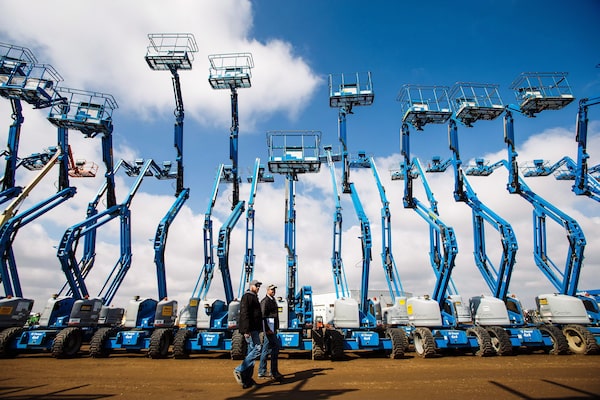
People walk through a row of boom lifts during the Ritchie Bros. auction in Nisku, Alta., on April 26, 2016.CODIE MCLACHLAN/The Canadian Press
Investors in Ritchie Bros. Auctioneers Inc. RBA-T reacted negatively to a multibillion-dollar deal that would expand the company beyond its core business of auctioning heavy equipment such as bulldozers and cranes and into auctions for salvaged vehicles, with the company’s shares losing one-fifth of their value after the announcement.
In its largest acquisition, the Burnaby, B.C., company agreed to buy Chicago-based IAA Inc. IAA-N for US$6.3-billion in cash and stock, plus US$1-billion in debt. IAA specializes in auctions of high-mileage, damaged and totalled vehicles on behalf of companies such as insurers and rental agencies in the United States, Canada and Britain.
In a call with analysts and an interview with The Globe and Mail, chief executive officer Ann Fandozzi emphasized the complementary nature of the two companies’ auction businesses. She said the acquisition simply adds another vertical for Ritchie Bros., which already runs auctions for farming, mining and construction equipment, as well as surplus government items and used cars and trucks.
The deal quadruples the number of auction yards for Ritchie Bros., and Ms. Fandozzi said the larger scale of the business will provide a higher return on the technology investments the company has been making. “This transaction is truly one plus one equals four,″ she told analysts.
However, investors reacted swiftly to the news. The company’s share price fell as much as 21 per cent Monday morning before clawing back some of that loss to close down 17.7 per cent on the day.
Ms. Fandozzi said she was caught off guard by the scale of the share decline. She said the company’s financial advisers on the deal, including Goldman Sachs, Guggenheim Securities and RBC Capital Markets, warned its shares might drop as traders engaged in merger arbitrage, which involves purchasing shares of the target company while short-selling the acquirer’s stock. However, Monday’s declines were far steeper than expected.
“We should know in the coming days if this is an arbitrage play or actual sentiment from our existing investors,” she said, noting that if it is indeed the latter the company will need to do a better job of educating its shareholders based on the merits of the deal.
Under the deal, the companies said they expect to achieve annual cost savings of US$100-million to US$120-million by the end of 2025, while the combined companies would have pro forma revenue over the past 12 months of US$3.8-billion and free cash flow of US$800-million, both at least double what Ritchie Bros. had as a standalone company over the same period.
During the third quarter, the results of which Ritchie Bros. reported Monday, the company’s revenue grew 25 per cent to US$412-million from the same period last year, while profit rose 33 per cent to US$43-million, beating expectations.
The strong market reaction to the deal was “way off,” said Gary Prestopino, an analyst at Barrington Research Associates in Chicago who covers Ritchie Bros.
“They’ve bought a profitable entity that generates a lot of adjusted EBITDA [earnings before interest, taxes, depreciation and amortization] and a lot of free cash flow.”
Bryan Fast, an analyst with Raymond James, said the company had “caught a lot of people off guard” with such a large move into a new area.
“The auction process for the companies is the same, but you’re dealing with a completely different set of buyers and sellers,” he said. “A lot of people own Ritchie [stock] because they dominate in the equipment space, and they know that space really well, and now they’re going outside it.”
The shares also took a hit because Ritchie Bros. is seen as a countercyclical investment, since buyers and sellers typically use its services through both strong economic times and recessions, and the scale of the IAA deal puts its “safe haven” status at risk, he said.
Adding US$1-billion in debt in a rising-rate environment also concerned investors, he added.
However, Mr. Fast said he doesn’t see it as “a big stretch” for Ritchie Bros. to successfully incorporate IAA into its business, particularly since several executives, including Ms. Fandozzi, have backgrounds in the automotive and insurance sectors.
After the close of the deal, which requires the approval of shareholders from both companies and is expected to take place in the first half of 2023, existing Ritchie Bros. shareholders will own roughly 59 per cent of the combined company, with IAA investors holding the balance.
The company would remain legally incorporated in Canada, but its official head office will move to IAA’s headquarters in Chicago.
With a report from Reuters
 Jason Kirby
Jason Kirby